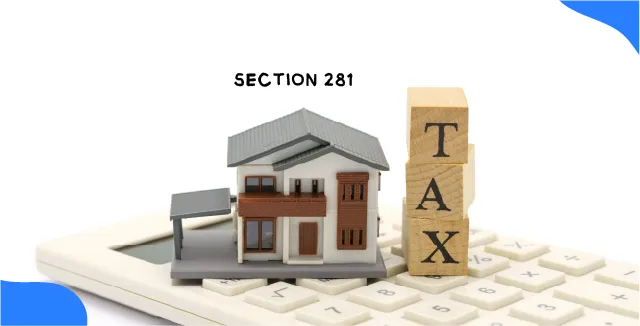Section 281 of the Income Tax Act – Asset Transfer Rules Explained

Check Your Loan Eligibility Now
By continuing, you agree to LoansJagat's Credit Report Terms of Use, Terms and Conditions, Privacy Policy, and authorize contact via Call, SMS, Email, or WhatsApp
Amit Tiwari, a 40-year-old electronics trader from Indore, had always wanted his own commercial showroom. In March 2024, he finalised a property deal worth ₹1.8 crore. He arranged ₹80 lakh through a home loan and ₹1 crore from his business savings.
But just before the registry, the bank’s legal advisor raised a red flag: “We need a No Objection Certificate (NOC) under Section 281 of the Income Tax Act before we can approve this deal.”
Amit was confused and asked his CA for help. The CA explained, “Since you have unpaid tax dues and want to transfer an asset, you must first get permission from the Assessing Officer under Section 281.”
This was Amit’s first encounter with this powerful but often-overlooked tax rule.
Importance of Section 281
Section 281 is important for anyone who has unpaid taxes or is going through an income tax check. It says that if you try to sell or transfer an asset during this time, the deal is not valid unless you get permission from the Income Tax Department.
This rule helps the government recover taxes and stops people from hiding or shifting their assets.
Amit had a pending tax demand of ₹14.2 lakh, which he got a few months earlier under Section 143(1). His CA told him that if he didn’t get the deal approved, the property registry could be cancelled later, and the tax department could even take the property.
Objectives of Section 281
The primary objective is to secure the interest of revenue in tax recovery matters. Taxpayers often attempt to evade recovery by transferring or selling their property during assessment or reassessment proceedings.
The government, through Section 281, ensures that it can take necessary legal action by:
- Declaring the transfer void against the revenue department
- Empowering the department to seize or restrict asset sales
- Creating accountability for both buyers and sellers
Core Objectives vs Practical Outcomes
In Amit’s case, even though the buyer was unaware of the law, the property transaction could be declared void, putting both Amit and the bank at risk.
How Section 281 Operates in Practice?
As per the Income Tax Act, Section 281, if a taxpayer transfers, mortgages, or charges an asset during a pending assessment or reassessment, that transfer is considered void against the tax authority, unless prior permission is obtained.
Numerical Example:
Read More - Section 28 of Income Tax Act – Income Included & Tax Implications
Amit’s outstanding dues were ₹14.2 lakh, and he was attempting to transfer a property worth ₹1.8 crore. As per the law, the transfer would be legally void unless Amit filed Form 34A and obtained clearance from the department.
Compliance Requirements and Due Process
To comply with Section 281, the taxpayer must apply in advance using Form 34A under Rule 111A of the Income Tax Rules.
Compliance Checklist for Amit
Amit submitted Form 34A to his AO. It included the property details, a copy of the registry agreement, details of the buyer, and his outstanding tax dues. After reviewing his case and confirming that the transaction wouldn't affect tax recovery, the AO issued a NOC within 40 days.
Amit submitted Form 34A to his AO. It included the property details, a copy of the registry agreement, details of the buyer, and his outstanding tax dues. After reviewing his case and confirming that the transaction wouldn't affect tax recovery, the AO issued a NOC within 40 days.
Exemptions and Exceptions
Not every asset sale falls under Section 281. The law provides specific exemptions where prior approval is not required:
- When the taxpayer has no pending tax liability
- When the transfer is not made during assessment/reassessment proceedings
- Where the asset is not immovable property or a high-value asset
- Where there is no intention to defraud tax authorities
In Amit’s case, because his assessment was ongoing, and he had tax dues, the exemption did not apply. However, if he had completed all tax payments and received an order under Section 143(3), he could have sold the property without Form 34A.
How Banks, Buyers and CAs Use Section 281?
Banks and legal teams are increasingly cautious due to high-value fraud in recent years. They now insist on a Section 281 clearance for:
- Property purchases above ₹50 lakh
- Cases where the seller is a registered taxpayer with known defaults
- Cases involving business entities or partners in litigation
Stakeholders Involved
When Amit’s buyer approached the bank for a loan, the loan manager clearly stated, “We will proceed only after verifying that there is no violation of Section 281.” This clause was even added to the home loan agreement.
What Happens If You Ignore Section 281?
Non-compliance can be very expensive and may attract:
- Nullification of the sale under the law
- Asset attachment or auction by the IT department
- Legal disputes between buyer and seller
- Rejection of loan applications by financial institutions
Had Amit gone ahead with the registry without permission, and if the department later moved to recover ₹14.2 lakh by attaching the property, his buyer would have lost rights over the asset, causing litigation and financial loss.
Also Read - Section 28 of the Income Tax Act – Profits and Gains of Business or Profession
Penalties and Consequences
Conclusion: Amit’s Learnings and Best Practices
Amit’s property deal taught him an important tax lesson: never ignore legal rules, especially with the Income Tax Department.
Thanks to his CA’s timely advice, Amit followed the right steps and completed the property transfer smoothly, keeping the bank and buyer happy. He also decided to pay off his tax dues sooner and consult his CA before any big deals in the future.
The main lesson? If you have pending tax dues or are under assessment, don’t sell, mortgage, or transfer valuable assets without checking Section 281. Doing this can save you months or even years of legal trouble and losses.
Frequently Asked Questions (FAQs)
Q1. How do I apply for permission under Section 281?
You must submit Form 34A to your jurisdictional AO along with supporting documents.
Q2. What is the processing time for a Section 281 certificate?
It can take 30 to 60 days, depending on the nature of the assessment and the clarity of the documents.
Q3. Is it applicable only for immovable property?
No. It applies to any asset that may be transferred during pending proceedings, but is most enforced in real estate matters.
Q4. Can the buyer be penalised if Section 281 is violated?
While the buyer is not penalised directly, the transfer can be rendered void, causing financial and legal distress.
Other Related Pages | |||
About the author

LoansJagat Team
Contributor‘Simplify Finance for Everyone.’ This is the common goal of our team, as we try to explain any topic with relatable examples. From personal to business finance, managing EMIs to becoming debt-free, we do extensive research on each and every parameter, so you don’t have to. Scroll up and have a look at what 15+ years of experience in the BFSI sector looks like.
Subscribe Now
Related Blog Post
Recent Blogs
All Topics
Contents
Quick Apply Loan
Consolidate your debts into one easy EMI.
Takes less than 2 minutes. No paperwork.
10 Lakhs+
Trusted Customers
2000 Cr+
Loans Disbursed
4.7/5
Google Reviews
20+
Banks & NBFCs Offers
Other services mentioned in this article








